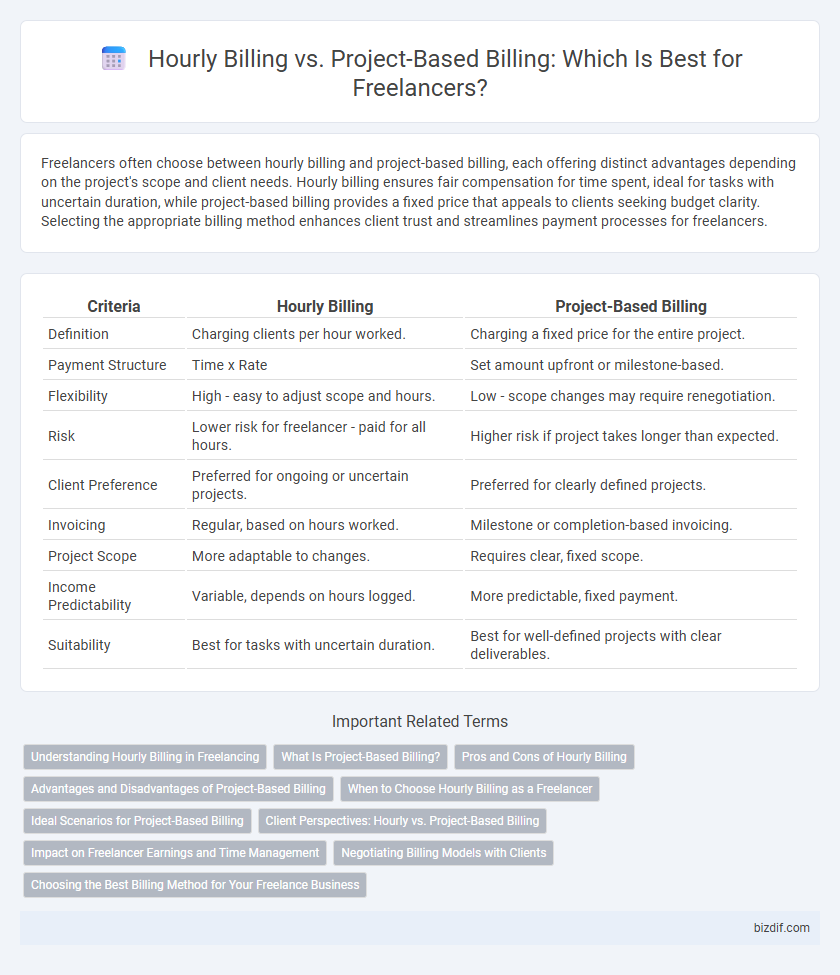Freelancers often choose between hourly billing and project-based billing, each offering distinct advantages depending on the project's scope and client needs. Hourly billing ensures fair compensation for time spent, ideal for tasks with uncertain duration, while project-based billing provides a fixed price that appeals to clients seeking budget clarity. Selecting the appropriate billing method enhances client trust and streamlines payment processes for freelancers.
Table of Comparison
| Criteria | Hourly Billing | Project-Based Billing |
|---|---|---|
| Definition | Charging clients per hour worked. | Charging a fixed price for the entire project. |
| Payment Structure | Time x Rate | Set amount upfront or milestone-based. |
| Flexibility | High - easy to adjust scope and hours. | Low - scope changes may require renegotiation. |
| Risk | Lower risk for freelancer - paid for all hours. | Higher risk if project takes longer than expected. |
| Client Preference | Preferred for ongoing or uncertain projects. | Preferred for clearly defined projects. |
| Invoicing | Regular, based on hours worked. | Milestone or completion-based invoicing. |
| Project Scope | More adaptable to changes. | Requires clear, fixed scope. |
| Income Predictability | Variable, depends on hours logged. | More predictable, fixed payment. |
| Suitability | Best for tasks with uncertain duration. | Best for well-defined projects with clear deliverables. |
Understanding Hourly Billing in Freelancing
Hourly billing in freelancing involves charging clients based on the number of hours worked, offering flexibility for projects with uncertain scope or evolving requirements. This method provides transparent tracking of time spent, facilitating accurate compensation for ongoing tasks or incremental work. Freelancers benefit from hourly billing by aligning income directly with effort and time investment, especially in consulting, development, or creative services.
What Is Project-Based Billing?
Project-based billing is a pricing model where freelancers charge a fixed fee for the entire scope of work agreed upon in a contract. This method provides clarity on total project costs, reducing uncertainties compared to hourly billing. It is ideal for well-defined projects with specific deliverables and deadlines, enabling better budgeting for both freelancers and clients.
Pros and Cons of Hourly Billing
Hourly billing offers flexibility and ensures freelancers are compensated for every minute worked, making it ideal for projects with evolving scopes. However, it can lead to client mistrust if hours seem inflated and may limit earning potential on tasks completed quickly. Tracking time meticulously is essential to justify rates and maintain transparency in hourly billing models.
Advantages and Disadvantages of Project-Based Billing
Project-based billing offers freelancers predictable income and clearer scope management, reducing the risk of scope creep and enabling clients to budget effectively. However, inaccurate project estimations can lead to underpayment or extended work without additional compensation, impacting profitability. This billing method suits well-defined projects but may prove challenging for tasks with uncertain durations or evolving requirements.
When to Choose Hourly Billing as a Freelancer
Freelancers should choose hourly billing when project scopes are uncertain, tasks require ongoing adjustments, or collaboration demands flexible time management. Hourly rates ensure fair compensation for unpredictable workloads, frequent client communication, and iterative revisions. This method is ideal for projects with evolving requirements where precise deliverables cannot be easily defined upfront.
Ideal Scenarios for Project-Based Billing
Project-based billing is ideal for freelancing tasks with well-defined scopes, such as website design or content creation, where deliverables and deadlines are clearly established. This method benefits clients seeking predictable costs and freelancers aiming to maximize efficiency by focusing on output rather than time spent. Project-based billing also works best for experienced freelancers confident in estimating project requirements and managing potential scope changes.
Client Perspectives: Hourly vs. Project-Based Billing
Clients often prefer project-based billing for its predictable budgeting and clear deliverables, minimizing financial risk and simplifying expense tracking. Hourly billing offers flexibility for evolving project scopes but can lead to uncertainty in total costs and requires meticulous time tracking for transparency. Understanding client priorities such as cost control and project scope clarity helps freelancers tailor billing methods to enhance client satisfaction and trust.
Impact on Freelancer Earnings and Time Management
Hourly billing provides freelancers with consistent income based on precise time tracking, allowing for better control over earnings and workload, while project-based billing often leads to higher income potential for efficiently completed projects but requires accurate scope estimation to avoid time overruns. The choice between hourly and project-based billing significantly influences time management strategies, where hourly rates demand strict monitoring of billable hours and project rates push freelancers to optimize workflows for faster delivery. Effective balancing of these billing methods can maximize freelancer earnings and ensure sustainable time allocation across multiple clients.
Negotiating Billing Models with Clients
Negotiating billing models with clients requires clear communication about the advantages and constraints of hourly versus project-based billing to align expectations and project scope. Emphasizing transparency in hourly billing allows clients to understand time allocation and flexibility, while project-based billing appeals through fixed costs and defined deliverables, reducing budget uncertainties. Freelancers should evaluate project complexity and client preferences, offering tailored proposals that balance risk and reward for sustainable collaboration.
Choosing the Best Billing Method for Your Freelance Business
Choosing the best billing method for your freelance business depends on project complexity, client preferences, and your workflow efficiency. Hourly billing suits ongoing or evolving projects requiring flexibility, while project-based billing is ideal for clearly defined tasks with specific deliverables. Analyzing project scope, risk, and time investment enables freelancers to optimize income and maintain transparent client relationships.
Hourly Billing vs Project-Based Billing Infographic

 bizdif.com
bizdif.com